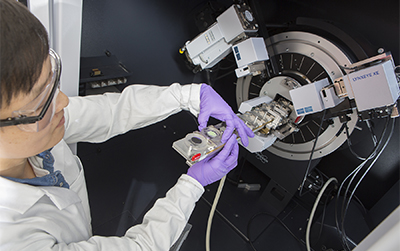
IMPROVING CAMPUS INFRASTRUCTURE
Some of the major improvements to infrastructure completed over the summer are very visible; others are not. Read in this issue about the many major projects completed by Physical Facilities and Information Technology Services, as well as the new programs offered by the University Center for Training and Development.

SCHOOL OF PHARMACY AND PHARMACEUTICAL SCIENCES OPENS NEW BUILDING
The opening of the new, $60-million School of Pharmacy and Pharmaceutical Sciences at the University's Health Sciences Campus in Johnson City, N.Y., headlines this quarterly report, but there's also good news about collaborations, external funding and student successes. Read more in this issue.

SUCCESSFUL INITIATIVES SUPPORT STUDENTS
It takes donors at many levels to make Binghamton University successful, and in this issue of the quarterly report, you can read about a number of them. Whether it's AVANGRID offering full-tuition scholarships and capstone project support, or playing golf to benefit the Alumni Legacy Scholarship, the Division of Advancement works with Binghamton supporters.

BINGHAMTON RESEARCH FUNDING SETS RECORD
Binghamton University reported research expenditures totaling $47.5 million in 2017-18, an increase of about 19 percent from the previous fiscal year. The figure tops 2011-12, the campus’ all-time best year for research funding, when just over $40 million was reported. The new record, which follows several years of steady growth, is an important sign of the campus’ creativity and innovation. Healthcare research accounted for nearly a third of expenditures, with electronics packaging and systems engineering following at about 22 percent.

BAXTER THE BEARCAT BOOSTS SCHOOL SPIRIT
The Division of Student Affairs spent the summer hosting students and families for orientation and preparing for the opening of the fall semester. With some new people on board and some others with new duties, it has been a busy time. Not too busy, though, to show Binghamton University pride, as you'll read about the new Baxter the Bearcat Bench in the University Union in this issue.

STUDENT-ATHLETES CONTINUE TO SUCCEED ACADEMICALLY
Student-athletes continue to shine on and off the courts and fields. The Athletics Department sets high academic standards, and student-athletes surpass them across the board. Read about the accomplishments made by student-athletes in their sports and in the classroom – and check out the videos showcasing fall sports and the new women's head basketball coach, Bethann Shapiro Ord, in this issue.

HELPING TO MAKE THE CAMPUS MORE INCLUSIVE
The Division of Diversity, Equity and Inclusion works to educate and empower everyone on campus in ways that create a welcoming community. From the Udiversity Educational Institute, that holds trainings for students, faculty and staff, to the Multicultural Resource Center and Q Center, the division's offices that work to build bridges and support students though education and events such as Sundaze, part of its Welcome Week programming. Read about the division's recent initiatives in this report.

DONOR SUPPORT ADVANCES BINGHAMTON UNIVERSITY
The Binghamton University Foundation had a successful 2017-18 year, bringing in the second highest amount of cash ever in support of the University. Read the numbers in this issue of the quarterly report, and learn one way the Foundation celebrates its donors.

Smart energy TAE to fund planning grant
The Transdisciplinary Area of Excellence in Smart Energy will fund a $50,000 planning grant in support of a faculty team that wants to establish a national center.
“The future of research is moving away from individual efforts and toward multidisciplinary teams,” says Wayne Jones, TAE chair and professor of chemistry. “We’ve had some success already but we need to identify several more. Awards of $10 million or $15 million don’t come from a single researcher typing up a proposal.”
The planning grant will provide funding to a faculty team to develop a strategic plan to build upon Binghamton’s expertise and reputation in smart energy. A one- to three-year award will be made for a planning grant beginning June 1, 2017.
Binghamton University is already home to four federally designated research centers: the NorthEast Center for Chemical Energy Storage (NECCES), a Department of Energy-funded Energy Frontier Research Center; the Center for Energy-Smart Electronic Systems (ES2), a National Science Foundation-funded Industry/University Cooperative Research Center; the New York Node of the NextFlex Flexible Hybrid Electronics Manufacturing Institute, a Department of Defense Manufacturing Innovation Institute; and the Developmental Exposure Alcohol Research Center (DEARC), which is funded by the National Institutes of Health.
The smart energy TAE focuses on energy generation, energy storage and energy efficiency, Jones says. Given the work done by NECCES and ES2, he sees energy generation as the next logical step for a Binghamton research center. But the center could focus on another topic such as economics, energy policy or smart grids.
Jones says the campus may invest in equipment and hiring to support a competitive team, and he sees the process as an exciting one for researchers at various stages of their careers. “You can make a difference in your own research area, but by partnering with others you can have an impact on society more broadly,” he says. “Here’s an opportunity to help set the direction, to define the paradigm for the campus.”
The full proposal packet is available online.